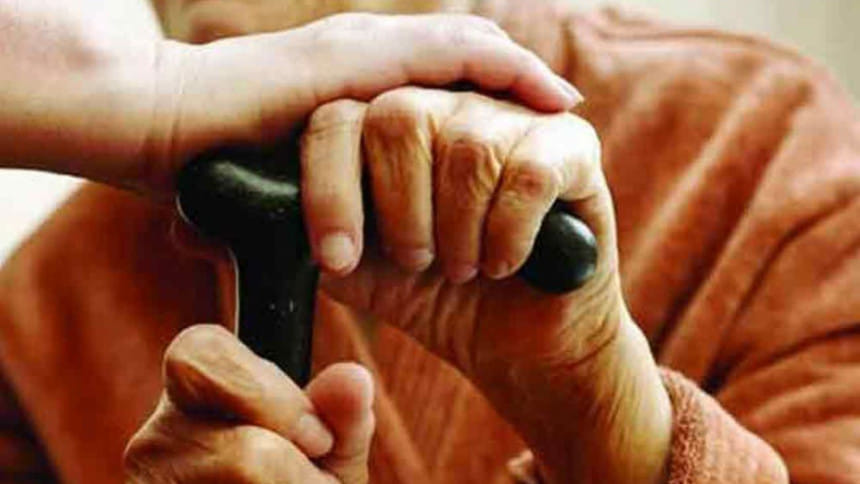Caring for ageing parents: Is law the only solution?

The Maintenance of Parents Act 2013 has made it a punishable offence for the children to fail to fulfil certain duties and responsibilities towards their parents as described in the Act. Although this law didn't receive adequate attention in the last six years, a recent announcement of a draft Rules under the Act by the social welfare ministry has attracted new debates regarding a specific provision contained in the draft. While describing various duties of children towards their parents, the draft Rules proposed a specific provision elaborating on "care of parents" which entails that if the child is not living with the parents, then his "wife" along with other family members would have to take care of his parents. Thus, the assumption is, a child who is not living with the parents for any justifiable reason must be a male child, and as such, the question of whether a son-in-law would have similar responsibilities if the daughter lived away from her parents had not been considered. This provision is simply a reflection of the traditional gender-specific role assigned by the discriminatory patriarchal standards. However, the entire premise of the draft Rules appears to be a somewhat weak attempt to hold onto the traditional family values and morality by means of a law.
The 2013 Act says that every child has to provide "maintenance" to her/his parents and the child has to live together with the parents for that purpose. The definition of "maintenance" in the law includes providing for "food, clothing, medical and housing facilities" as well as "to give company". Thus, by maintenance, this law is not referring to any monetary award; it is rather referring to certain services and duties towards the parents. The law provides that every child has to regularly look after the health of the parents, arrange for their medical support and services, and in case they're not living together, has to regularly visit them. As such, if a child fails to provide "maintenance", the law is giving a scope to the parents to file a criminal complaint, as a consequence of which the child may be fined or sent to jail.
The 2013 law contains further ambiguities which the proposed Rules could have clarified. The law is silent about any age-limit, source of income or financial capabilities of the parents. Also, in case of defining "children", the law is referring to any capable child, without mentioning her/his minimum age or financial status.
The meaning of the term "to give company", included in the definition of "maintenance" in the 2013 law, has been further elaborated in the proposed draft Rules. It says that every child has to regularly give company to the parents. However, if the child cannot live together with the parents for jobs or any other appropriate reasons, then she/he has to visit them twice a year. The proposed Rules even included, within the definition of "giving company" to the parents, communication via telephone and other modern mediums of communication. This means that all these duties will fall within the definition of "maintenance" and as such, any non-compliance by the children will amount to a punishable offence. From a plain reading of this law, it may be construed as morally justifiable, but from a legal-analytical perspective, it is rather difficult to understand how matters of social norms, morality and values can be subjects of a law. Contents of a law should be such that they are specific and enforceable; otherwise the law will remain confined within the black letters only.
The 2013 law contains further ambiguities which the proposed Rules could have clarified. The law is silent about any age-limit, source of income or financial capabilities of the parents. Also, in case of defining "children", the law is referring to any capable child, without mentioning her/his minimum age or financial status. The draft Rules further explains that a capable child is one who is able to bear the expenses of the maintenance of the family. This means that even a person below the age of 18 can be held liable under this law, if she/he is the earning member of the family. The law and the draft Rules are also not clear as to how the responsibilities as regards the maintenance of parents will be decided when there are more children than one and they cannot mutually decide among themselves on the issue. In addition, the law is also silent about parents who may have been abusive or negligent towards the wellbeing of the child. The law is also assuming that the father and mother of a child are always living together and does not include situations where parents may have been living separately due to, for example, divorce.
Another aspect of this law is that the definition of "child" refers to either a male or a female child. This may appear to be a positive aspect of the law, but it does raise an important question. While women are still given unequal or no rights over the property of parents in personal family laws, in terms of sharing expenses for parental maintenance, this inequality has not been reflected in the existing laws. Additionally, how freely a daughter can use her own income should also be considered. This is crucial in the context of how patriarchy often dominates financial independence of a woman in the family.
Among the Asian countries, India and Singapore are useful examples where parental maintenance has been made legally binding upon the children. However, the difference is, under these laws, the court can award a certain amount of money as maintenance to the parents by way of a civil remedy. But when maintenance is defined by social and moral duties instead of any monetary award and when its breach is punished with criminal sanctions, it does pose serious doubt as to whether this law can be at all implemented in practice, and if implemented, whether that will effectively address the social security questions of the senior citizens.
Enacting new and more stringent laws cannot always be the only solution to tackle a social crisis. To address the plight of the aged parents, we also need to address the related social realities. Attention must be given to the indicators of progressive social changes. At the same time, we also need to address the weak social protection mechanism that leaves no choice for an aged parent other than to be at the mercy of their children after a certain age. The number of our ageing population has naturally increased over the years, but compared to that, existing social protection benefits for the aged population remain inadequate. This draft Rules does entail provisions regarding establishing national-level bodies to protect the interests of parents, including provisions for establishing parental care homes. However, the criminal responsibility of negligent children on the one hand, and the state's commitment towards ensuring social protection on the other, are two different issues and should not be made dependent on each other to be legally implemented.
Taslima Yasmin is Assistant Professor, Department of Law, University of Dhaka. Email: [email protected]
Follow The Daily Star Opinion on Facebook for the latest opinions, commentaries and analyses by experts and professionals.
To contribute your article or letter to The Daily Star Opinion, see our guidelines for submission.

 For all latest news, follow The Daily Star's Google News channel.
For all latest news, follow The Daily Star's Google News channel. 



Comments